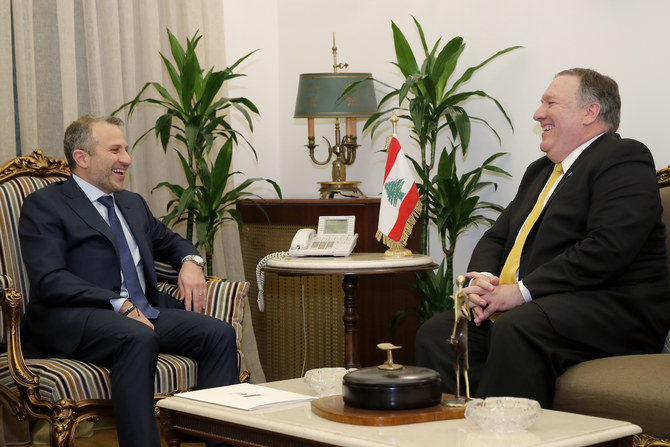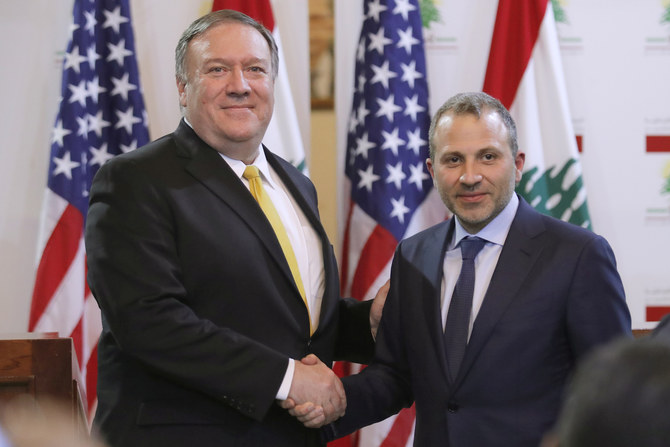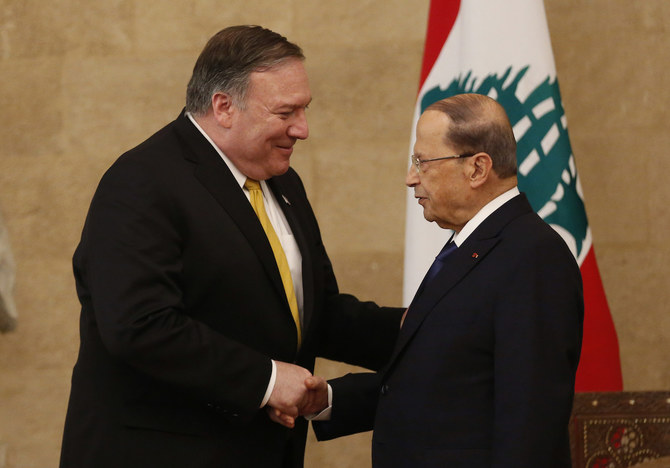BEIRUT: On the last leg of his Middle East tour in Beirut, US Secretary of State Mike Pompeo called on Lebanon to stand up to Iran and Hezbollah, whom he accused of "criminality, terror and threats".
Pompeo met with President Michel Aoun and Parliament Speaker Nabih Berri, Foreign Minister Gebran Bassil, all political allies of Hezbollah. The said they had told him the group was part and parcel of Lebanese politics.
But Pompeo said Hezbollah and Iran have nothing positive to offer to Lebanon.
“What did Hezbollah and Iran offer Lebanon but coffins and weapons? Qassem Soleimani (senior Iranian military commander) continues to undermine the legitimate institutions and the Lebanese people,” he said after meeting with Lebanon's political leaders.
“How can storing thousands of missiles on Lebanese territory strengthen this country?” said Pompeo, who was on tour in the Middle East to drum up support for Washington's harder line against Iran.
Pompeo said he believes that Iran does not want the situation in Lebanon to change because change is a threat to Iran’s ambitions to dominate the country.
He spoke of Iran’s criminal networks of drugs and money laundering that place Lebanon under international monitoring, and he said: “The Lebanese people should not be forced to suffer because of an illegal and terrorist group.”
Pompeo noted that US sanctions on Iran and Hezbollah are working, citing a speech by Hezbollah leader Hassan Nasrallah this month asking the group's supporters for funds as evidence US pressure was working.
"Our pressure on Iran is simple. It's aimed at cutting off the funding for terrorists and it's working," he said standing alongside Bassil after their meeting. "We believe that our work is already constraining Hezbollah's activities."
Pompeo said Iran gave Hezbollah as much as $700 million a year.
The heavily armed Hezbollah has a large militia that has taken part in Syria's civil war alongside President Bashar Al-Assad's government, but it also has elected members of parliament and positions in the national unity government.
The group's influence over Lebanese state institutions has expanded in the last year. Together with allies that view its arsenal as an asset to Lebanon, it won more than 70 of parliament's 128 seats in an election last year.
The group has taken three of the 30 portfolios in the government formed by the Western-backed Prime Minister Saad Al-Hariri in January, including the health ministry - the first time it has held a ministry with a significant budget.
Pompeo said he shared concerns about "external and internal pressures on the government, including coming from some of its own members, which do not serve an independent thriving Lebanon".
The United States would continue to use "all peaceful means" to choke off financing that "feeds Iran and Hezbollah terror operations", he said, pointing to "smuggling, criminal networks and the missue of government positions".
"Lebanon faces a choice: bravely move forward as an independent and proud nation, or allow the dark ambitions of Iran and Hezbollah to dictate your future," he said.
Lebanese President Michel Aoun earlier told Pompeo that Hezbollah was a Lebanese party with popular support, the Lebanese presidency said.
"Preserving national unity and civil peace is a priority for us," Aoun told Pompeo, the presidency said on its Twitter feed.
Speaker Berri said earlier in a statement that he had told Pompeo that Hezbollah's "resistance" against Israel was a result of continuing Israeli occupation of Lebanese territory.
Israel, the closest US ally in the Middle East, regards Iran as its biggest threat and Hezbollah as the main danger on its borders.
(With Reuters)






























